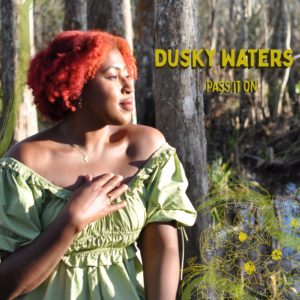A band’s first album is both a palate cleanser and an opportunity. Will they engage listeners in a recognizable yet fresh way? What are they attempting? Did they succeed?
Dusky Waters hits the ground running and sets the tone from the beginning with the title track. Jenn Jeffers sings acapella, “Go down, Moses/ Pass it on/ Take your hurts/ Hand them to your son.” After these plaintive lyrics, strings enter, and the rest of the band progressively steps in. By the 3/4 mark, the hypnotic interweaving of all that’s been building levitates to its cruising altitude and takes you home wondering where you’re heading next.
Within seconds, songwriter Jeffers referenced “Go Down, Moses,” the Black spiritual and abolitionist song of freedom from bondage and struggle, as well as Louis Armstrong, who recorded it. The instrumentation, initially banjo and viola alone (maybe guitar and mandolin shading in there too), has harkened back a century ago when Black string bands like The Mississippi Sheiks and The Booker Orchestra walked the earth, though Dusky Waters soon stretches out to a fuller symphonic sweep.
In the March 2002 issue of No Depression, it was noted that, “…there was a time when ‘Black hillbilly music’ was everywhere across the South.” Dusky Waters harkens back to that era but with an inventiveness born by the keen lens of history and music that’s come since.
The entire album is a highlight, including “Jaula,” the Spanish word for “cage,” with lyrics en Español, and the poppy “Southeasterly Wind.” This is a band of vision and ambition. From sublime, tasteful, and beautifully ranging arrangements, to songs both warm and strong.
Jeffers cuts through the sonic bliss with the vocal clarion call of one who has lived it, wants to tell what she’s seen, and has a view beyond. She’s coming to take her place alongside inspirations Elizabeth Cotten, Rhiannon Giddens and the Avett Brothers. The rest of the band knows well the nature of phrasing, economy and timing. Tommy Henson’s piano parts, in particular, strike as the perfect example of this, though I would be remiss not to include praise for Analiese De Saw, Conner McCready, Dylan James and guest Kasey Ball.
The last song, “Footnote” repeats, “I’m not who I was then/ And I won’t be again,” before the vocal layering pulls away, leaving Jeffers to hand the baton to solo piano, and then silence. Dusky Waters is a group to pay attention to, and while the sky’s the limit, their heads aren’t in the clouds. This is a band walking the dusty walk and talking the good talk. Anyone who thinks otherwise can kick rocks.



